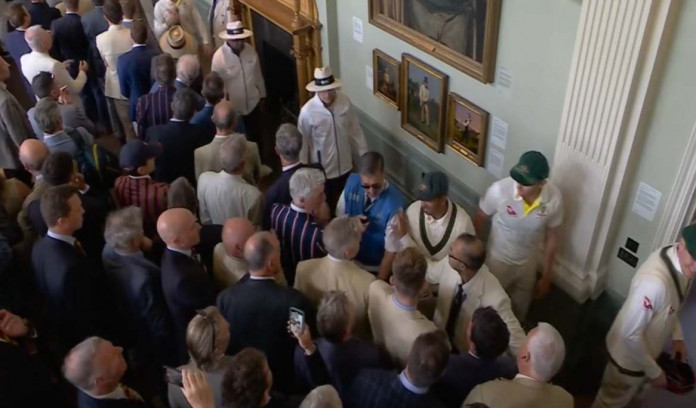LONDON: It has been described as “the most evocative four walls in world cricket” and somewhere to watch the game in an atmosphere of almost monastic calm, far from the madding crowd.
Yet the usually tranquil Long Room at Lord’s became a seething cauldron of hate on Sunday as Marylebone Cricket Club members abused Australia players returning from the field during a lunch break on the last day of the second Ashes Test following the controversial dismissal of England’s Jonny Bairstow.
They, and spectators around the ground, were incensed by an incident where Australia wicket-keeper Alex Carey threw the ball at the stumps after Bairstow walked out of his crease after ducking under a Cameron Green bouncer.
Bairstow seemingly believed the ball was dead at the end of the over but, following a referral by his colleagues in the middle, TV umpire Marais Erasmus confirmed the batsman had been stumped.
The usually sedate crowd at the ‘Home of Cricket’ responded by chanting “Same old Aussies, always cheating” while boos rang around the famous old venue in northwest London for several minutes.
Australia, despite a stunning 155 from England captain Ben Stokes, eventually won the match by 43 runs to take a 2-0 lead in the five-match Ashes series.
An embarrassed MCC later issued an “unreserved apology” to the touring side, with club secretary Guy Lavender adding three members “directly involved” in the lunchtime flare-up had been suspended immediately pending an investigation.
Lord’s had seen nothing quite like it since the 1980 Centenary Test between England and Australia, when umpire David Constant was manhandled on his way into the pavilion by members angry at a lack of play following several rain delays.
Few sports make such a fuss about the ‘spirit of the game’ as cricket.
MCC remains deeply concerned as it still retains worldwide responsibility for cricket’s extensive rules, or Laws as they are known, even though it is more than 50 years since it ceased running the English game.
The Bairstow row was a classic of the kind, with even Stokes accepting Erasmus had made the correct decision but questioning whether Australia ought to have proceeded with the appeal.
Furious England coach Brendon McCullum suggested his players might skip post-Ashes beers with the Australia team and questioned the visitors’ sportsmanship.
“I can’t imagine we’ll be having a beer with them any time soon,” McCullum told the BBC. “We have three Tests to land some blows and try to win the Ashes. That is where our focus will be.”
McCullum added that “the spirit of the game” was vital.
“In the end you’ve got to live with the decisions you make, and that’s life,” he said. “But I feel from our point of view, if we were in the same situation, we might’ve made a different decision.”
McCullum’s comments triggered scorn in Australia, where media noted that the former New Zealand captain once stumped Muttiah Muralitharan in a 2006 Test in Christchurch when the Sri Lankan left his crease to congratulate team-mate Kumar Sangakkara for bringing up a century.
McCullum also rolled down the stumps to run out Paul Collingwood at the 2009 Champions Trophy when the England batsman wandered out of his crease, though New Zealand captain Daniel Vettori called Collingwood back.
Back at the Lord’s pavilion, Australia opener Usman Khawaja remonstrated with several MCC members.
“Some of the stuff that was coming out of the members’ mouths was really disappointing and I wasn’t just going to stand by and cop it,” Khawaja told Australian media.
Built in 1889-90, the Lord’s pavilion remains one of the most famous buildings in world cricket. Portraits of the game’s greats from WG Grace to modern-day heroes adorn the walls of the Long Room, which spans almost the length of the ground floor — hence its name.
The biggest problem for cricketers unfamiliar with Lord’s has often been finding their way out of the dressing rooms near the top of the pavilion and through the Long Room before entering the field, with England batsman David Steele getting lost on his Test debut in 1975 and ending up in the basement toilets.
It wasn’t until 1998 that women were allowed in the pavilion after MCC voted to admit female members thereby ending more than 200 years as a men-only club, although an exception had long been made for Britain’s Queen Elizabeth II.
There is now roughly a 20-year wait to join MCC’s 18,000 strong membership and follow the likes of British prime ministers Alec Douglas-Home and John Major, as well as rock star Mick Jagger and actor and comedian Stephen Fry, the current MCC president, in watching cricket from the Long Room.
Former Australia batsman and coach Justin Langer once said walking through the Long Room was like “being bearhugged by an invisible spirit”.
There was little “invisible”, however, about Sunday’s fracas.
“MCC apologised for the behaviour of some of the members,” said Australia captain Pat Cummins. “Some of them might lose their membership over the way they behaved. Other than that one time, they were fantastic all week.”
Cummins, in comments that will really sting MCC’s hierarchy, then referenced the notoriously raucous Birmingham venue for the series opener. “I think just standards that are held by the members are maybe a bit different to what you expect from certain members of the crowd at Edgbaston,” he said.
Cummins defended his team over Bairstow’s dismissal. “I thought it was fair. You see Jonny [Bairstow] do it all the time, he did it on day one to David Warner, he did it in 2019 to Steve [Smith],” Cummins told reporters.
“It’s a really common thing for keepers to do if they see a batter keep leaving their crease. Cares [Carey], full credit to him, he saw the opportunity, rolled it at the stumps, Jonny left his crease. You leave the rest to the umpires. It was all one motion, there was no pause or sneakiness about it.”
Stokes was keen to move on from the incident but added he would not want to win in such a fashion at the end of an over.
“The first thing that needs to be said is, it is out,” he said. “If I was the fielding captain I would have put a lot more pressure on the umpires to ask them what their decision was around the over and around the spirit of the game and would I want to potentially win a game with something like that happening – and it would be no.”








